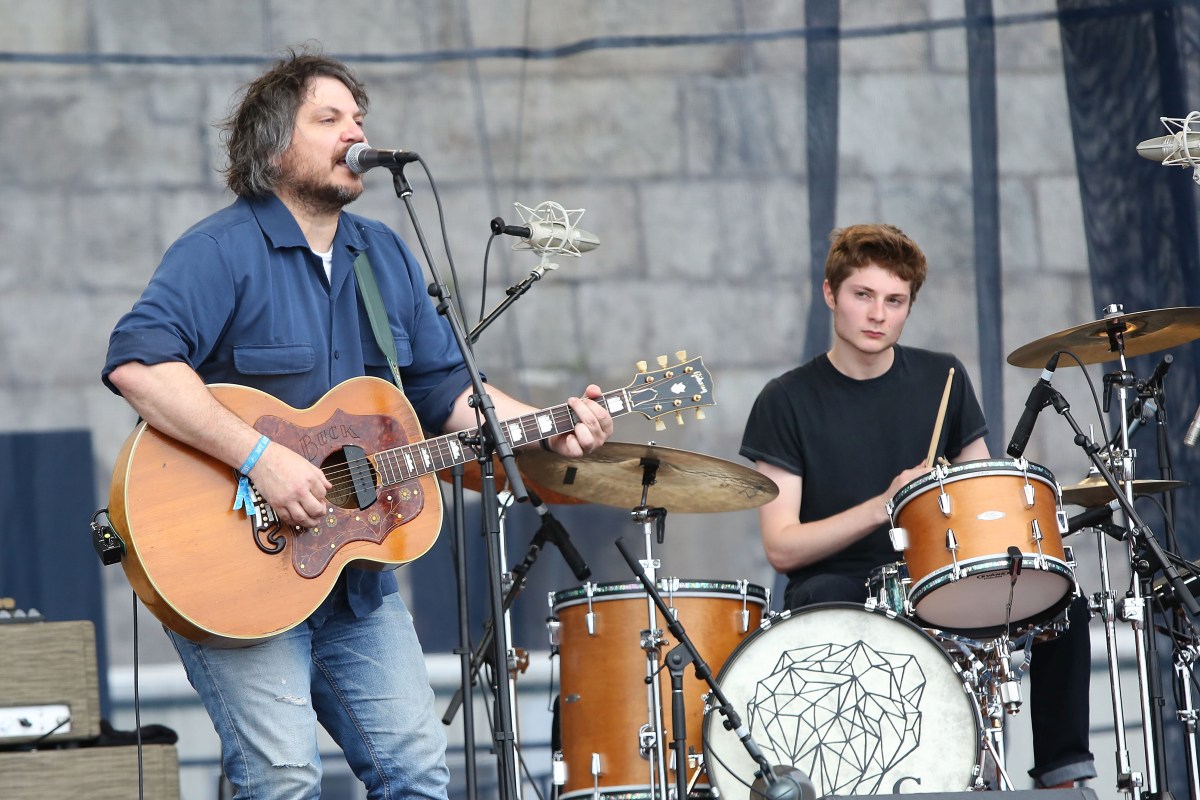Slowly but surely, we as a society are coming around to the idea that dads might actually be cool.
Don’t believe me? Open up Instagram this Father’s Day and see how many throwback photos of your friends’ dads you find. Heck, go to the oldschooldads account right now if you need immediate proof. They’re young and good-looking, perhaps with more hair than they’ve got now, rocking a pair of timeless shades and sporting an outfit that’s both incredibly dated and stylish again thanks to fashion’s cyclical nature. Maybe you’ve got your own photo all ready to post — your old man cradling you as a baby, your own personal version of the back cover of McCartney (in which a bearded, beaming Paul McCartney poses with his infant daughter Mary tucked inside his decidedly cool jacket).
Implicit in these photos and all the likes they rake in is an understanding that they are hip enough to be shared; like anything we post on social media, they’re carefully curated. But while we’ve reached a point where showing off that retro shot of your dad in his 20s on the ‘gram is acceptable or even encouraged, his taste in music is another thing entirely, dismissed instead as “dad rock.”
It’s a term that’s both meaningless and all-encompassing, thrown out as a shorthand for, depending on whom you ask, anything from Steely Dan or Lou Reed’s ’80s output to Band Of Horses and Vampire Weekend. It has even been applied to current young indie non-dads like Mac DeMarco. The definition has evolved as more and more rock fans age into the dad demographic, but it’s most commonly used as a pejorative. As Steve Hyden writes in his book Twilight of the Gods: A Journey To The End of Classic Rock, “In terms of dad rock, the modifier ‘dad’ is meant to weaken the word ‘rock,’ divorcing it from any sense of power, danger, or sexual excitement.” It’s the musical equivalent of socks with sandals or corny puns.
While the term is said to have originated in the U.K. in the ’90s as a descriptor for classic rock-influenced acts like Oasis, it took off on this side of the pond around 2007 after being used in Pitchfork’s review of Wilco’s Sky Blue Sky. “An album of unapologetic straightforwardness, Sky Blue Sky nakedly exposes the dad-rock gene Wilco has always carried but courageously attempted to disguise,” Rob Mitchum wrote. “Never has the band sounded more passive, from the direct and domestic nature of Tweedy’s lyrics, to the soft-rock-plus-solos format (already hinted at on [A Ghost Is Born]’s ‘At Least That’s What You Said’ and ‘Hell Is Chrome’) that most of its songs adhere to.”
Since then, it’s taken on a life of its own, being used as blanket expression for bands who are old enough to be fathers, newer artists who are heavily influenced by some of the albums their dads would spin in the ’60s and ’70s, and, quite simply, music your dad likes.
Below, we take a closer look at the various genres that have been scarlet-lettered with the dad rock moniker in recent years. As has been made clear by the reviewers who have lazily wielded the term as an insult over the years, this is not one-size-fits-all territory.
Classic Dad Rock
The simplest dad rock definition is “stuff your dad used to listen to” — we see it most commonly applied here to artists like Credence Clearwater Revival, the Eagles, Chicago, Clapton, McCartney (the most “dad” of all the Beatles, by far), Bruce Springsteen, Paul Simon and the Grateful Dead, but it has been used to describe just about any rock act from the ’60s or ’70s. The implication is still that these songs are uncool, that they’re safe or neutered compared to their edgier contemporaries.
Of course, finding the music your parents enjoyed to be hopelessly lame is one of pop culture’s oldest traditions, and dubbing this stuff “dad rock” ignores the fact that your dad no doubt rolled his eyes at what his dad was listening to. As time rolls on, we all become dads to some degree (perhaps not literally, but you don’t have to be a father — or even a man — to find yourself losing your edge at a certain age). Our tastes will be mocked by the generations that follow us; that’s just how it goes. Eventually they grow out of it, and the music they rejected simply for its association with the man who’s responsible for half their DNA gets accepted into the canon alongside Frank Sinatra and Elvis Presley and whatever else previous generations thumbed their noses at when they were young. Then the next crop of punk kids comes along and makes fun of them, and the cycle starts all over again.
Using “dad rock” as a synonym for “classic rock” is not only dismissive of some truly great music, but it also erases women from the conversation entirely, ignoring all the female fans, artists and critics who loved, performed or championed rock and roll right alongside their male counterparts. “Dad” is code for dorky, but “mom” isn’t even a consideration.
Sad Dad Rock
Kate Siamro is one such woman who loves “dad rock.” An employee of Spinster Records in Dallas, she hosted a “Sad Dad Rock” event at the store last year to poke some good-natured fun at a genre she loves and some of her regular customers who embody its stereotypical demographic.
“Sad dad rock to me is kind of a whole new genre, where you’re listening to like the National and the War on Drugs,” she explains to InsideHook. “When you think about it, in a weird way, these bands are slightly inspired by the ’70s. They definitely have that ’70s rock vibe, but it’s at a slower pace and it’s a little bit more depressing. The lyrics are really intense. I think the father of sad dad rock would be Elliott Smith.”
The event, which Siamro says “started out a joke and then became a real thing,” featured a “sad dad checklist” for participants to check off the “sad dad” distinctions that applied to them (like “You liked Fleetwood Mac better when Peter Green was in it,” “You listen to NPR during work commutes” or “You won’t eat a steak that’s cooked more than medium”) to win discounts on records, prizes or sad dad trophies. (“They were really tiny to make them extra sad,” Siamro says with a laugh.) Despite the nature of the event, Siamro says she was pleasantly surprised by the amount of women who showed up; she passed out fake mustaches to them and sported some false facial hair herself to embrace her inner “sad dad.”
While obviously meant to spoof the genre, the idea for the event comes from a place of love. “It wasn’t aimed a direct person, but kind of at a bunch of regulars I have that I really admire,” she says. “Just a certain crowd that you have where you have these really hip dads, but they’re always so sad. They buy the saddest music.”
The biggest misconception, Siamro says, is “that it’s not cool,” that listening to these moody tunes makes one somehow soft or out-of-touch. But ultimately, it’s a way for men to reject toxic masculinity and tap into their emotions.
“Some people will avoid their sadness because they don’t know how to deal with it, and I think sometimes using music to funnel that out, it’s a really cleansing experience,” she says. “It sounds cheesy, but it helps you get it out of your system so it doesn’t ruin your life, you know? Whatever questions you’re asking yourself, the what-ifs, like, ‘Oh, what if I went into acting?’ or ‘Why didn’t I do that?’ or ‘Why didn’t I do this?’, I think sometimes listening to music just helps you get it out. Especially sad dad rock. A lot of these bands, they’re depressing, but they’re kind of honest too. So we’ve gotta embrace our sad dads. We’ve gotta let them be sad because they’re just getting it out, you know?”
Modern Dad Rock
Sadness isn’t unique to the more modern bands saddled with the dad distinction. Whether it was the Traveling Wilburys demanding to be handled with care or Bruce Springsteen breaking hearts with The River, sensitivity and emotion has always been a part of these artists’ oeuvre.
But that’s not why we label them “dad rock.” Nowadays, it’s more often than not used to describe the particular brand of indie rock appreciated by millennial or Gen X dads who, to our great distaste, have refused to surrender their coolness. We begrudgingly accept them as hip, but it comes with an asterisk — they are cool in spite of their dadness. We crack jokes about their tattoos and their craft beer and their penchant for quoting John Darnielle of the Mountain Goats every chance they get to water them down and put them in a box.
There are a lot of lazy descriptors that tend to get tossed around when people talk about The National and their music — stuff about “hipsters” and “coffee shops” and “Brooklyn,” all indie rock cliches meant to convey a certain level of whiteness and pretension. The members of The National are dads, and they make music often enjoyed by men of a certain age, but even if “dad rock” actually meant something, reducing their music to it would be a mistake. For one, the gendered term overlooks the contributions of Berninger’s wife, Carin Besser, who has contributed lyrics and backup vocals to the group since 2005’s Alligator or the long list of female voices that can be heard on their latest album, I Am Easy To Find. But beyond that, it implies that their music is best enjoyed by certain demographics, that the universal themes they tackle like death, love, or the passage of time are somehow only accessible to a select few.
The truth is, the best music — the achingly gorgeous stuff, the songs whose lyrics get etched on our hearts for generations — is always made without any consideration for what’s hip or trendy. What some see as “dad rock” is actually a level of comfort or confidence that allows an artist to do whatever they want to without any thought of what people will think. And what’s cooler than that?
This article was featured in the InsideHook newsletter. Sign up now.



















![[L-R] Bill Berry, Michael Stipe, Mike Mills and Peter Buck of R.E.M. at the Aragon Ballroom in Chicago, Illinois on July 7, 1984.](https://www.insidehook.com/wp-content/uploads/2024/12/rem-book-interview.jpg?resize=750%2C750)




